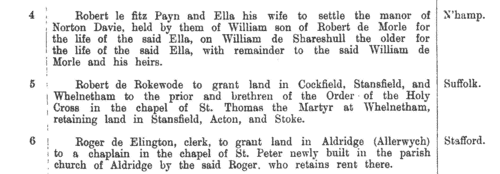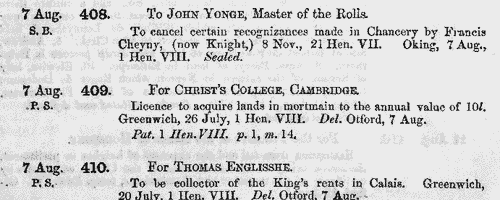Bussy Surname Ancestry ResultsOur indexes 1000-1999 include entries for the spelling 'bussy'. In the period you have requested, we have the following 50 records (displaying 11 to 20): Single Surname Subscription | | | Buying all 50 results of this search individually would cost £238.00. But you can have free access to all 50 records for a year, to view, to save and print, for £100. Save £138.00. More... |
These sample scans are from the original record. You will get scans of the full pages or articles where the surname you searched for has been found. Your web browser may prevent the sample windows from opening; in this case please change your browser settings to allow pop-up windows from this site. Fine Rolls
(1377-1383)
The fine rolls of the 1st to 6th years of the reign of king Richard II record part of the government administration in England, with orders sent out day by day to individual officers, and commitment of particular responsibilities and duties. There is also some material relating to Wales, Scotland, Ireland and the English possessions in France. BUSSY. Cost: £4.00.  | Sample scan, click to enlarge

| Liegemen and Courtiers (1397)
The surviving earliest records of the Privy Council of England, from the 10th year of the reign of Richard II to the 11th year of Henry IV, mostly found among the Cottonian manuscripts in the British Museum, were transcribed literatim by sir Harris Nicolas and printed in 1834 by command of king William IV. The records mainly refer to the day to day business of the Crown, particularly regarding the administration of the kingdom and relations with France, Scotland, Ireland and Wales. Almost all are in French.
BUSSY. Cost: £6.00.  | Sample scan, click to enlarge

| Liegemen and Courtiers (1398)
The surviving earliest records of the Privy Council of England, from the 10th year of the reign of Richard II to the 11th year of Henry IV, mostly found among the Cottonian manuscripts in the British Museum, were transcribed literatim by sir Harris Nicolas and printed in 1834 by command of king William IV. The records mainly refer to the day to day business of the Crown, particularly regarding the administration of the kingdom and relations with France, Scotland, Ireland and Wales. Almost all are in French.
BUSSY. Cost: £6.00.  | Sample scan, click to enlarge

| Close Rolls
(1441-1447)
The close rolls of the 20th to 25th years of the reign of king Henry VI record the main artery of government administration in England, the orders sent out day by day to individual officers, especially sheriffs of shires: they are an exceptionally rich source for so early a period. There is also some material relating to Wales, Scotland, Ireland and the English possessions in France. BUSSY. Cost: £4.00.  | Sample scan, click to enlarge

| Close Rolls
(1447-1454)
The close rolls of the 26th to 32nd years of the reign of king Henry VI record the main artery of government administration in England, the orders sent out day by day to individual officers, especially sheriffs of shires: they are an exceptionally rich source for so early a period. There is also some material relating to Wales, Scotland, Ireland and the English possessions in France. BUSSY. Cost: £4.00.  | Sample scan, click to enlarge

| Clergy, the religious and the faithful in Britain and Ireland
(1471-1484)
These are abstracts of the entries relating to Great Britain and Ireland from the Lateran and Vatican Regesta of pope Sixtus IV. Many of these entries relate to clerical appointments and disputes, but there are also indults to devout laymen and women for portable altars, remission of sins, &c. This source is particularly valuable for Ireland, for which many of the key government records of this period are lost. Many of the names in the text were clearly a puzzle to the scribes in Rome, and spelling of British and Irish placenames and surnames is chaotic. Sixtus IV was consecrated and crowned 25 August 1471 (the day from which his pontificate is dated) and died at Rome 12 August 1484. The extracts were made by J. A. Twemlow from Vatican Regesta dxlvi to dclxxxi and Lateran Regesta dccxiii to dcccxxxviii, and published in 1955. Not all the Lateran registers survive from this pontificate, but were still in existence in the 18th century, when indexes were compiled giving rubricelle, or brief summaries of the papal bulls; nor, indeed, have all these indexes now survived, but Twemlow added an appendix listing all the rubricelle relating to the British Isles extant for the reign of Sixtus IV.BUSSY. Cost: £4.00.  | Sample scan, click to enlarge

| Landowners and tenants in Lincolnshire
(1345-1485)
Inquisitions ad quod damnum were held by the appropriate sheriff or escheator (or other officer in whose bailiwick the matter in question might lie) to investigate cases in which the royal or public interest might be damaged by proposed alienation or settlement of land (especially alienation to religious uses, into mortmain). The key findings from these inquisitions were as to the tenure of the land and the service due from it; its yearly value; the lands remaining to the grantor, and whether they sufficed to discharge all duties and customs due from him; and whether he can still be put upon juries, assizes and recognitions, so that the country be not burdened by his withdrawal from them. Generally speaking, this process had the makings of a system of licensing such alienations, and raising money in proportion to the valuations. Equally, there are many items that deal with subjects such as the closing of public roads, the felling or inclosing of woods, or the proposed grant of liberties or immunities. A calendar of these inquisitions from the 19th year of the reign of king Edward III to the 2nd year of Richard III was prepared by the Public Record Office and published in 1906. We have now indexed this calendar by surname and county. Most of the individuals appearing in the calendar are either pious individuals seeking to make grants to religious bodies for the sake of their souls; or landowners securing the disposition and settling of their real estate. But some other names do appear - tenants, trustees, chaplains and clerks.BUSSY. Cost: £6.00.  | Sample scan, click to enlarge

| Yorkshire Testators and Legatees
(1484-1508)
Wills and testaments from the diocese of York (Yorkshire, Nottinghamshire, Hexhamshire, Lancashire north of the Ribble, and southwest Westmorland) registered at York. Richmond and Southwell archdeaconries had their own lower probate jurisdictions, so the wills registered at York are predominantly from the East and West Ridings and the eastern part of the North Riding of Yorkshire. In theory, wills dealt with real property and testaments with personal property, but the distinction hardly applies in practice: most of these wills are in Latin, but some are in English. Being before the Reformation, they commonly start with benefactions to churches, chantries, chapels, &c., and with provisions for the burning of candles ('lights') and saying of masses. This publication in 1869 by the Surtees Society as Testamenta Eboracensia iv is an edition by James Raine of selected wills from the period. Some additional material is included from the Prerogative Court of Canterbury and the York Dean and Chapter archives.BUSSY. Cost: £4.00.  | Sample scan, click to enlarge

| Patent Roll 1 Henry VIII
(1509-1510)
Royal grants of all kinds were enrolled on the Patent Rolls of England. Many of these grants originated as signed bills (S. B.) or privy seals (P. S.). J. S. Brewer calendared the rolls for the first year of the reign of king Henry VIII (22 April 1509-21 April 1510) for the Master of the Rolls, including all the surviving signed bills and privy seals (some of which had never led to enrolment), in this volume published in 1862. We have reindexed this: most of the names that occur are of those granted royal offices, or wardships or ecclesiastical preferments that were in the hands of the Crown, and often the names of those whom they superseded. BUSSY. Cost: £6.00.  | Sample scan, click to enlarge

| Tradesmen of York
(1272-1558)
No man or woman could trade in the city of York without having obtained 'freedom' of the city.Their names were recorded on the 'Freemen's Roll', or Register of the Freemen of the City of York, which contains about 19,900 names for this period. A list of names was prepared for each year, the year being here reckoned as starting at Michaelmas (29 September) until 1373, and thence at Candlemas (2 February). Each annual list starts with the name of the mayor and the camerarii or chamberlains. The chamberlains were freemen charged with the duty of receiving the fees of the new freemen; of seeing that only freemen traded in the city; and of preparing this roll, which was compiled from the names on their own account books from the receipts for the fees. There are three groups of freemen: those who obtained freedom after serving out an apprenticeship to a freeman; the children of freemen; and those who claimed freedom by 'redemption', i. e. by purchase or gift from the Mayor and Court of Aldermen.
BUSSY. Cost: £2.00.  | Sample scan, click to enlarge

|
Research your ancestry, family history, genealogy and one-name study by direct access to original records and archives indexed by surname.
|












